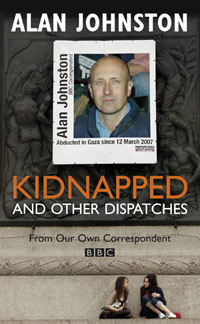‘Kidnapped’ in Gaza
A BBC correspondent’s book--now available in the United States--details his Gaza kidnapping and collects balanced reportage from the Middle East and Central Asia.
Ralph Seliger

Along with millions of others around the world, I was appalled by the kidnapping of BBC correspondent Alan Johnston in the Gaza Strip on March 12, 2007. As his disappearance lengthened, I was stricken with the fear that he’d be murdered by his captors – members of a fringe terrorist group known as “The Army of Islam” – but was duly relieved when he emerged relatively unharmed 114 days later.
I always figured that Johnston would get a book out of his frightening experience. Kidnapped And Other Dispatches (Profile Books, April) – ostensibly by Johnston – does the job, but it’s more an “instant book,” a quickie to take advantage of recent headlines, than the extended analysis that I had anticipated.

Originally published in Britain in 2007, it is short (160 spare pages) – mostly a compilation of transcripts of Johnston’s broadcasts from Gaza, Afghanistan and Central Asia, where he was assigned prior to being in Gaza from 2004 until 2007. The book is basically broken into vignettes, which form short chapters. These radio portraits are lyrical, notable for their descriptions of the nitty-gritty of everyday life and death in the Middle East and Asia, rather than the intricacies of politics and strategy.
Kidnapped also includes an interview conducted by Tony Grant, the book’s editor and Johnston’s BBC producer, in which the journalist discusses his Gaza ordeal in detail. Ironically, although kidnapped by Islamist terrorists, he was rescued by Hamas forces after they seized full control of Gaza in June 2007, in a military putsch against Fatah and the Palestinian Authority. Johnston’s widely-reported predicament gave Hamas the incentive to prove its credibility as a governing party by cracking the whip upon other armed groups in the Gaza Strip.
While relating the despair and fear he felt while held captive, Johnston maintains an admirable sense of humility:
Whatever else it was, my Gazan incarceration wasn’t what some Iraqi prisoners had been forced to endure at Abu Ghraib jail. It wasn’t the Russian Gulag and it certainly wasn’t the Nazi death camps. I felt that I wouldn’t be able to pick up a book again about the Holocaust without feeling a sense of shame if I were somehow to break down mentally under the very, very, very much easier circumstances of my captivity.
Johnston appears to be a gentle and sensitive Scottish bachelor, with the peculiarly adventurous and inquisitive disposition that suits a foreign correspondent. I recall his singular tone on the BBC World Service (he now hosts “From Our Own Correspondent” for the network). His generically British accented voice is soft, slightly raspy and melancholic – the last due at least in part to the sad human tales of conflict and its aftermath that he relays.
Johnston’s reportage is fair-minded. Uncritical supporters of Israel would be disturbed by his clear pronouncement that Jewish settlements in occupied Palestinian territories are illegal, and by his hard-hitting stories of Palestinian suffering at Israel’s hand.
“Put yourself in Gaza’s position,” he says in one paragraph encapsulating the maddening situation:
Imagine…that your society was heavily armed but very poor and crammed into one of the most crowded places on earth…. Imagine that…the borders were usually shut, making it impossible to leave. Imagine that the army of the powerful neighboring state had killed well over 200 people in recent months. Imagine that America was trying to break your newly elected government because it refused to recognize that neighboring state, which was actually occupying your territory. Imagine, too that that government of yours was intent on throwing out all past peace agreements with the neighbors and the world…leading you into crushing poverty and isolation.
Yet uncritical supporters of the Palestinian cause might object to Johnston’s candid assessment of rocket attacks and suicide bombings against Israeli civilians; he reports on one such attack from the scene in Israel. He is totally aware that Palestinian terrorism boomerangs with Israeli reactions that deepen the Palestinian plight.
For example, there is this observation from December 2006: “Day after day they’ve fired rockets into Israeli towns and villages…. And it’s made no difference to the militants that their rockets have been falling on civilians. In fact, such is their loathing for their enemy that when an Israeli woman in her fifties was killed last month[,] the Hamas and Islamic Jihad organizations fought to claim credit.”
Still, Johnston registers a slight reason for hope in Kidnapped, which gives voice to at least one Palestinian who envisions a common human bond with Israelis. Even after the brother of Mohammad Adwan died in late 2006 while trying to rescue neighbors – – nearly 20 of whom were killed in an incident of misdirected Israeli artillery – – Johnston reports that Adwan simply said: “Our children are scared, and their children are scared. To live in peace is better.”








